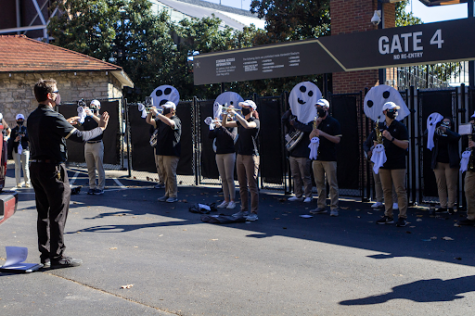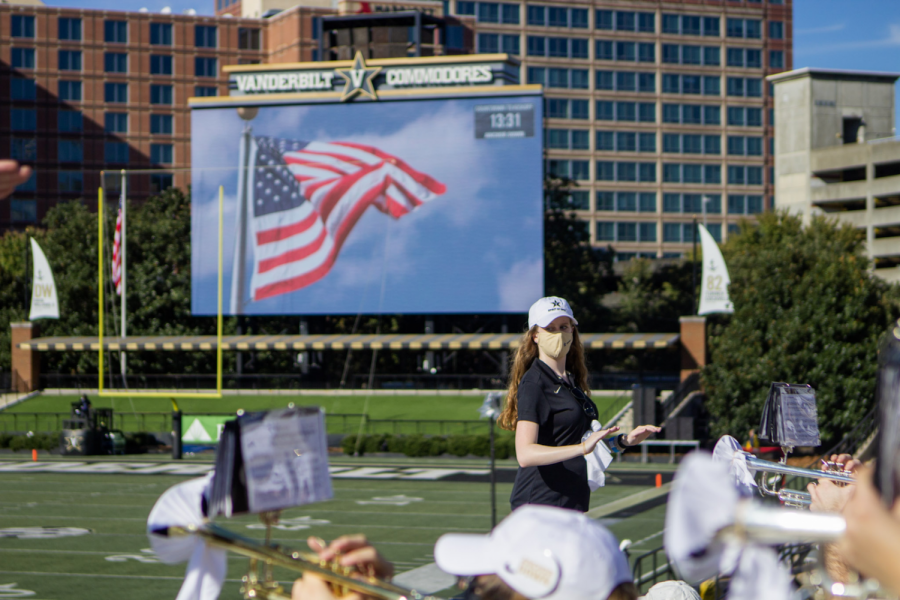In accordance with university protocols, the Spirit of Gold Marching Band has adapted its program to ensure the safety of its members throughout the semester.
As of Nov. 17, zero cases of transmission among band members have been reported since beginning tri-weekly rehearsals on Oct. 6, according to Director of Athletic Bands Douglas Morin.
Morin attributes their safety to a number of newly-implemented protocols, including attending outdoor rehearsals, using instrument bell covers, wearing musician face masks while playing and following extended social distancing requirements.
Per SEC guidelines, the band cannot perform on the field during games. In addition, the university has disallowed students from other educational institutes from being a part of the band.
According to Drum Major Megan Dernberger, the band has also changed its attire from full uniform to a ballcap, a polo shirt and black khaki pants. This decision is an additional effort to reduce the risk of transmission from the hands-on uniform-fitting process.
“One of the greatest challenges we faced was that we normally have three weeks or so before the first game, including one intense week of camp to prepare for our first game. That was not the case this year, as the university was still learning and processing the data,” Morin said.
Dernberger added that they did not receive any notice from the university of beginning practice until Oct. 4, a day after the first home game.
Since then, the band has been holding regular rehearsals, which are streamed on Zoom for those who cannot attend in-person. Attendance is flexible, and students receive service rewards in the form of financial compensation based on the number of rehearsals they show up to. In previous years, service awards were subtracted from an initial amount based on attendance, but the current award-based system serves to compensate members for unforeseen complications during the pandemic. First-year Isabella Hirsch commented on her experience with the safety protocols of the band.
“I wasn’t sure how in-depth we were going to go with the safety protocols, but I honestly think we’re doing a really good job,” Hirsch said. “Everyone is following them for the most part, and I think we just want to continue to have a season, so we’ll do what it takes.”

Reflecting upon teaching during these times, Morin emphasized an understanding for breaking down and simplifying the process. For the band’s previous two standstill performances on Oct. 10 and 31, students have focused on familiarizing themselves with important repertoire without being concerned with drills and movements.
However, Morin said that in preparation for its final game performance on Nov. 21, the band has been practicing marching formations and transitions for a pre-recorded field show which will be projected during halftime.
“As the music has been learned, we’ve been able to add more motion,” Morin said. “The pre-recorded show allows us to still be on the field and do what makes marching band so unique and so much fun for a lot of our members.”
Considering the changes to the halftime show and the program as a whole, Dernberger commented on the thoughts shared among her fellow musicians.
“It’s a little disappointing that we can’t do a full halftime show on the field and wear our uniforms, so it’s a very big environmental difference from last year,” Dernberger said. “However, I think we’re making the best out of an unknown situation, and we’re hopeful to continue performing during basketball season.”
Clarinet Section Leader Charlotte Hoigard voiced similar sentiments.
“I would’ve loved to have a normal season, but I know it’s not possible to do safely. I want it, but I don’t want it under these conditions,” Hoigard said.
While plans for the second semester are still in the works, Morin mentioned that the band is reviewing the feasibility of having an indoor rehearsal space as opposed to an outdoor one.
“It’s been the most unique season since I’ve been involved with marching band, as both a student and director,” Morin said. “Pandemics are not something that we’ve worked with before, so I really appreciate the students’ dedication as we’ve processed how to install protocols to prioritize their health. I thank them wholeheartedly.”









